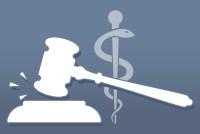Latest KFF Health News Stories
Ouch. That ‘Free’ Annual Checkup Might Cost You. Here’s Why.
The designers of the Affordable Care Act might have assumed that they spelled out with sufficient clarity that millions of Americans would no longer have to pay for certain types of preventive care. But they didn’t reckon with America’s ever-creative medical billing juggernaut.
Out for Blood? For Routine Lab Work, the Hospital Billed Her $2,400
Convenient as it may be, beware of getting your blood drawn at a hospital. The cost could be much higher than at an independent lab, and your insurance might not cover it all.
¿Mamografías a los 40? Nueva pauta para la detección del cáncer de seno genera debate
Algunos médicos e investigadores que están interesados en un enfoque más individualizado para encontrar tumores problemáticos se muestran escépticos y plantean preguntas sobre los datos y el razonamiento detrás del cambio radical del Grupo de Trabajo de Servicios Preventivos de Estados Unidos
Mammograms at 40? Breast Cancer Screening Guidelines Spark Fresh Debate
There is no direct evidence that screening women in their 40s will save lives, yet modeling suggests expanding routine mammography to include them might avert 1.3 deaths per 1,000. Highlighting the risk of false positives, some specialists call for a more personalized approach.
Journalists Explain Impact of Texas Judge’s ACA Decision and Cuts in Federal Food Benefits
KHN and California Healthline staff made the rounds on national and local media this week to discuss their stories. Here’s a collection of their appearances.
No-Cost Preventive Services Are Now in Jeopardy. Here’s What You Need to Know.
A federal judge’s recent ruling on the Affordable Care Act is by no means the final word. Even parsing its impact is complicated. Here are key issues to watch as the case works its way through the legal system.
La decisión podría afectar los exámenes de detección sin copago y servicios preventivos similares que la mayoría de los estadounidenses con seguro tienen como parte de sus planes de salud.
Judge’s Decision Would Make Some No-Cost Cancer Screenings a Thing of the Past
A U.S. District Court ruling overturned the section of the Affordable Care Act that makes preventive health services — from colonoscopies to diabetes screenings and more — available at no cost to consumers.
California’s Massive Medicaid Program Works for Some, but Fails Many Others
Medi-Cal serves more than one-third of the state’s population — offering a dizzying range of care to a diverse population. In the new “Faces of Medi-Cal” series, California Healthline will assess the program’s strengths and weaknesses through the lives and experiences of its enrollees.
¿Comprando seguro de salud de ACA? Aquí, lo nuevo de este año
Comprar ahora significa tener cobertura vigente a partir del 1o de enero de 2023. Aunque gran parte de los planes permanecen iguales año tras año , hay algunos cambios que los consumidores deben tener en cuenta.
Shopping for ACA Health Insurance? Here’s What’s New This Year
Consumers may find relief in some key changes made by Congress and the Biden administration, although other issues remain unsettled.
Journalists Dig In on the Fiscal Health of the Nation and Hospital Closures in Rural Missouri
KHN and California Healthline staff made the rounds on national and local media this week to discuss their stories. Here’s a collection of their appearances.
La última década ha sido testigo de una rápida expansión de las pruebas genéticas. Pero, ¿cuál es su real relevancia clínica?
Genetic Tests Create Treatment Opportunities and Confusion for Breast Cancer Patients
Doctors are divided on whether blanket testing of breast cancer patients is warranted, since scientists and physicians are sometimes unsure about how to interpret the results.
Court Ruling May Spur Competitive Health Plans to Bring Back Copays for Preventive Services
The Affordable Care Act required that health insurers provide many medical screenings and prevention services at no out-of-pocket cost to health plan members. But insurers and employers may consider adding cost sharing for preventive services now that a federal court ruled the ACA’s mandate is unconstitutional.
Many Preventive Medical Services Cost Patients Nothing. Will a Texas Court Decision Change That?
A federal judge in Texas issued a decision this week that affects the Affordable Care Act. It says one way that preventive services are selected for no-cost coverage is unconstitutional.
KHN’s ‘What the Health?’: Judge Takes Aim at the Affordable Care Act’s Preventive Care Benefits
A federal judge in Texas — the same one who tried to strike down the Affordable Care Act as unconstitutional in 2018 — has ruled against some of the ACA’s preventive benefits, including the requirement that employers cover medication to prevent HIV. Meanwhile, the U.S. Department of Veterans Affairs tries to make abortions slightly more available to veterans and their dependents. Alice Miranda Ollstein of Politico, Sarah Karlin-Smith of the Pink Sheet, and Joanne Kenen of the Johns Hopkins Bloomberg School of Public Health and Politico join KHN’s Julie Rovner to discuss these issues and more. Also this week, Rovner interviews KHN’s Lauren Sausser, who reported and wrote the latest KHN-NPR “Bill of the Month” installment.
‘Free’ Screening? Know Your Rights to Get No-Cost Care
Even a decade in, the Affordable Care Act’s recommendations to simply cover preventive screening and care without cost sharing remain confusing and complex.
Preventive Care May Be Free, but Follow-Up Diagnostic Tests Can Bring Big Bills
Under the Affordable Care Act, insurers cannot charge consumers for various preventive services that have been recommended by experts. But if those screenings indicate more testing is needed to determine whether something is wrong, patients may be on the hook for hundreds or even thousands of dollars for diagnostic services.
Her First Colonoscopy Cost Her $0. Her Second Cost $2,185. Why?
Preventive care, like screening colonoscopies, is supposed to be free of charge to patients under the Affordable Care Act. But some hospitals haven’t gotten the memo.





















